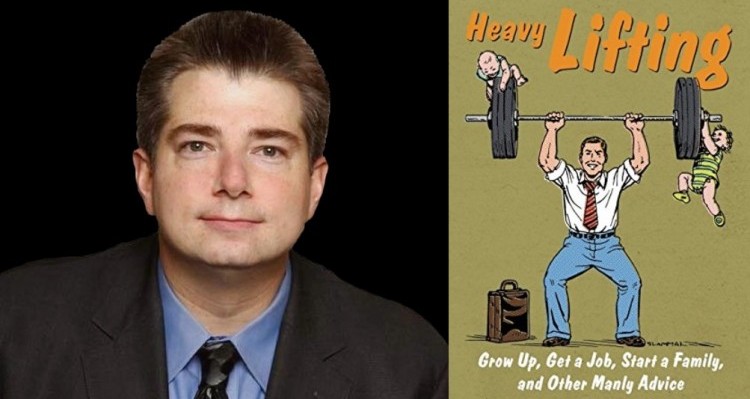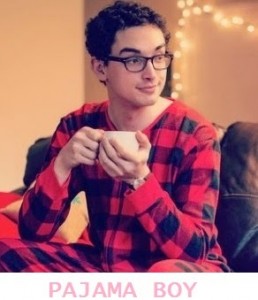The Eternal Adolescence of the American Man (Author Interview)

AUTHOR INTERVIEW WITH JIM GERAGHTY – National Review blogger, Jim Geraghty, known for his Campaign Spot blog, co-authors a new book with NRA News’ Cam Edwards about the eternal adolescence of boys in American culture today. They provide various remedies to break the “Peter Pan” syndrome of many younger men today. Learn more in our interview below with Jim Geraghty!
Congratulations Jim on your new book, Heavy Lifting: Grow Up, Get a Job, Raise a Family, and Other Manly Advice! Can you give us an overview of your book, and what was your inspiration in writing it?
We wanted to dispel the biggest lie that young men are told today, that growing up, getting married, and having kids are terrible burdens that tie you down and limit you. They’re actually what make life worth living.
Cam and I get together about once a week, and one of our recurring topics was this phenomenon of young men, and sometimes not-so-young men, “failing to launch” – living with their parents, not getting real jobs or a career path, not getting married, not having kids – basically, living in an extended adolescence.
We’re both just past 40, and we’d say that all of these steps, particularly our wives and children, are the most fulfilling, most important, and best things we’ve ever done. Neither one of us would hold ourselves up as perfect – we both had our stumbles along the way — but we’re both certain that this is what we’re meant to do with our lives.
We have this strange phenomenon of what once were considered very common, almost required rites of passage are now rarer and almost optional. Very smart people such as Helen Smith and Kay Hymowitz have written about this from an academic perspective, but a lot of the discussion has a tone of, “young men, you have to do this,” with a lot of finger-wagging.
Cam and I felt there’s a need to showcase the upside of growing up and being a grown man, why you should want to be married, a father, a hard worker, a good neighbor. Our culture has been in this recurring state of rebellion against the Ward Cleaver image, when in fact the world needs more men like that once-stodgy image, not fewer.
What three takeaways would you like readers to leave with after reading your book?
First and foremost, I hope they laugh a lot. We take a long tour through some of modern family life’s odder corners, such as when you have to put down the video games, where Mitt Romney and Fiddy Cent agree on career advice, feeling like a crash-test-dummy when you ask a girl out, the insanity of the garter-belt tradition at weddings, how to handle strangers asking to rub your wife’s pregnant belly, Lamaze class, the traumatic flashbacks of Back to School Night, the Kafkaesque process of buying and selling a home, and so on.
where Mitt Romney and Fiddy Cent agree on career advice, feeling like a crash-test-dummy when you ask a girl out, the insanity of the garter-belt tradition at weddings, how to handle strangers asking to rub your wife’s pregnant belly, Lamaze class, the traumatic flashbacks of Back to School Night, the Kafkaesque process of buying and selling a home, and so on.
If a reader has already made these choices in life, I hope they feel affirmed and reminded of the joys of marriage and parenthood. The responsibilities and commitments involved in them are real and they are serious, but they fulfill us in a way that the slacker extended-adolescence lifestyle just can’t. If they’ve been wondering about those paths in life, I hope we’ve made them sound more appealing and worthwhile.
In some ways, this is one of the most socially-conservative things I’ve ever written, but it’s not really a polemic or about the political topics we usually associate with social conservatism. It’s about what a man is supposed to do with his life, and what’s most important, and why family is what’s at the heart of us.
In the middle of all of these funny stories, Cam and I share some very personal, heartfelt stories about how we’ve gotten through our most painful moments in life. I was impressed that Cam, my best friend, could write with such raw honesty about some of the tough times in his marriage. I wrote about a time in my early 20s when I was drinking far too much, too often, and what got me out of that hole. I also wrote for the first time about the difficult pregnancy of our second son and what was undoubtedly the worst moment of my life, being told that he might not make it. (Everything did turn out fine.)
The lesson you take from the most difficult moments in your life is that they put everything into perspective, and force you to focus upon what really matters most to you.
What is your solution to the “Peter Pan” syndrome you believe men are experiencing today by never wanting to grow up? What does this say about our society?
Ultimately, the solution begins with that individual – you “gotta wanna.” Just as you can’t help someone who won’t help himself, you can’t force someone to change their lives; it has to come from within.
Having said that, it’s indisputable that our society’s view of victimhood has changed in recent decades, and there are times where it seems like our campuses and pop culture are just cultivating irresponsibility and self-pity. If someone says, “the problems in my life are the world’s fault, not mine!” is there someone around to say, “No, that’s not true. Your problems are at least partially, and probably largely your fault and a consequence of choices you have made. The good news is this means you have the power to do something about them”?
I’d love for Heavy Lifting to spur a national conversation on what exactly we want young men to grow up to be. Because it’s very easy to mock dads – they’re a sitcom staple, so hapless and hopeless and bumbling, basically just a bigger kid for mom to take care of, except the kids get to be snarkier punch lines. Why would any young man want to grow up and be that?
Off the screen, dads are the ones who get it done. (Admittedly, we may be too busy to whine about how hard it is.) Military, police, firemen – their ranks are full of dads, doing their best to balance work and family. Today’s fathers are more involved with their children’s lives than any previous generation. I think there’s a hunger for acknowledgement and celebration of this.
There was this enormous social media reaction to a Cheerios commercial that featured a confident, extremely competent, loving-his-role dad, and I think that reflected the fact that so many dads out there – and the women who love them – feel that they’re excluded, or at the very least rarely accurately portrayed, in our culture.
Tell us a little more about yourself!
- Favorite Movie: One of the fantastic side benefits of having boys is that you can watch Star Wars, Indiana Jones, or the Marvel Superhero movies at just about any time and nobody thinks that you’re weird or that you should outgrow that.
- Favorite TV Show: My all-time favorites rank among the stranger ones in television history: Twin Peaks, Firefly, Max Headroom. I’d put “24” and Cheers as my more “mainstream” picks.
- Favorite Food: Anything not still moving.
- Favorite Band: The last two concerts I went to were U2 and Billy Joel. The SiriusXM Satellite music station I listen to most often is the Big 80s channel.
- Where do you get your news from primarily? I write a morning newsletter for National Review, The Morning Jolt, so weekday mornings before 8 a.m. I’ve usually scanned all the big newspapers, a bunch of conservative blogs and web sites, Twitter, Facebook, the Drudge Report…
- If you could meet any person, dead or alive, who would it be? I got to meet both before they passed, but I’d love to see William F. Buckley interview Andrew Breitbart.
- What do you do for fun? I am a momentarily-pleased New York Jets fan. My non-work reading tends towards thriller novels where a lot of things blow up, such as Brad Thor’s
What books, authors, or conservative-themed books, influenced your political philosophy and outlook on life?
My views have varied a bit over life, sometimes shifting a bit more libertarian, sometimes more socially conservative, but I was never really on the Left. I think one of the factors that made me conservative was that I was blessed by two parents that loved me, a safe community, a church that taught me right from wrong – and I never saw any of these things as oppressive, patriarchal, retrograde institutions that need to be overturned.
When my peers went through this teenage rebelliousness, I remember thinking, “wait, you’re rebelling against your parents, who love you and take care of you? Against the church, running that soup kitchen and blood drives? Against your teachers, who are trying to prepare you for life afterwards? Against the cops, who keep you safe? The idea that modern American life represents some sort of intolerably unjust arrangement, in need of a radical uprising of the proletariat, is pretty absurd when you look at the alternatives around the world.
Like many other folks on the Right, Rush Limbaugh, playing back on WABC, was my first contact with this sense of a larger movement, as opposed to just an instinct or “common sense.” From there it was National Review and The Weekly Standard and other magazines, when you read a piece and you just find yourself nodding as you read and saying, “yes, that’s what I’ve been thinking, I just couldn’t describe it until now when I read it on the page.”
My colleague and friend Jonah Goldberg really blazed a path in the Internet era for writing with great skill in both humor and serious points. Jonah can be goofy, absurdist, off the wall, and then come swinging back around a few sentences later to make this serious, thoughtful, important point. I don’t try to imitate him, or James Lileks, or P.J. O’Rourke, or these other writers who mix humor and fun with their more serious points, but they undoubtedly shaped how I define good writing.
Tags: Cam Edwards, Heavy Lifting, Jim Geraghty











